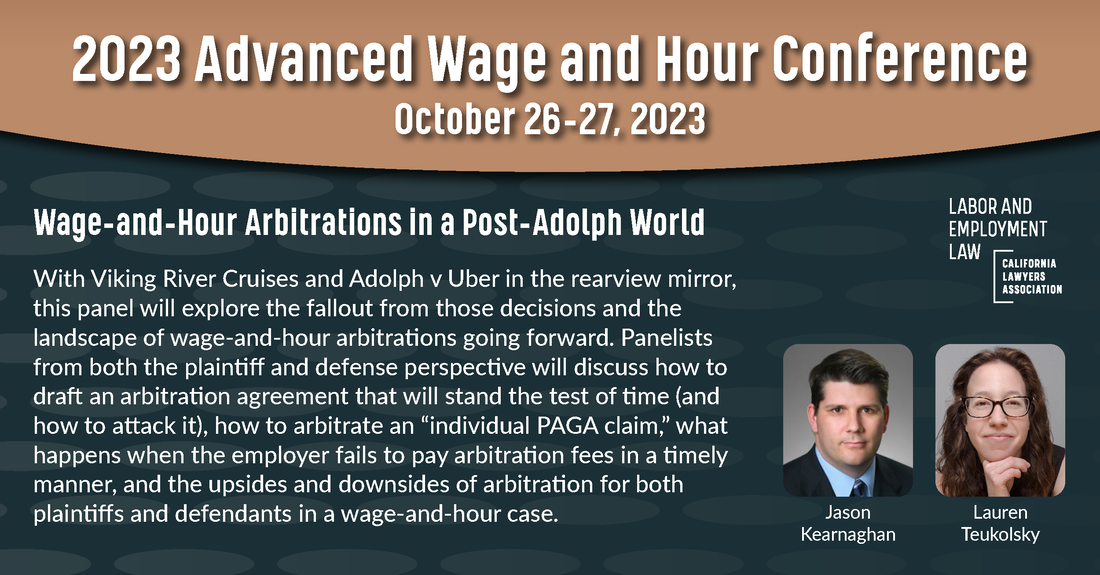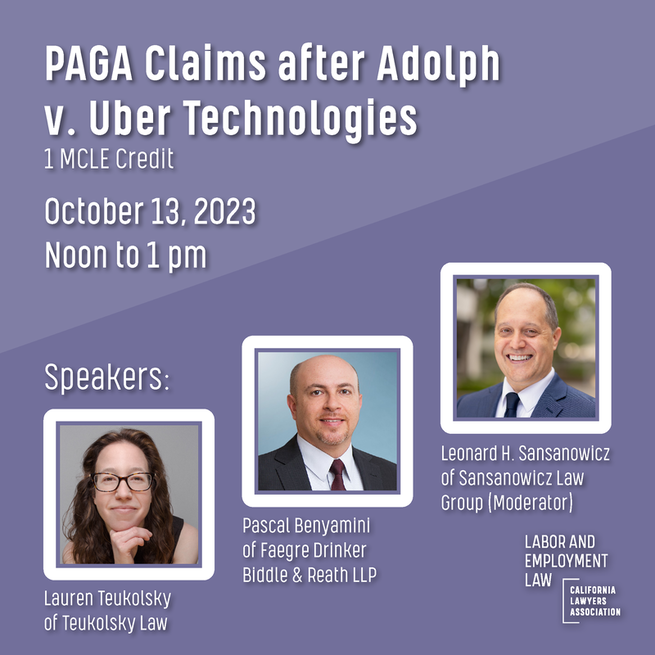|
Lauren Teukolsky’s “Wage and Hour Case Notes” were published in the November 2023 edition of the California Labor and Employment Law Review. Ms. Teukolsky’s column describes seven new decisions from California and federal appellate courts that affect wage-and-hour law. Among the cases are significant rulings regarding reimbursements for pandemic era work-from-home expenses, arbitration exemptions for transportation workers, time entry rounding, and one of the first appellate applications of Adolph v. Uber, among other topics.
Wage-and-hour law is an ever-changing field with new appellate decisions that often reshape the legal landscape. Ms. Teukolsky has navigated those appellate decisions for over 20 years and is an expert in both state and federal wage-and-hour law. She speaks frequently on wage-and-hour topics at national and state conferences and is regularly quoted by media outlets for her insights on the topic. The California Lawyers Association (CLA) is a voluntary statewide bar association. Its mission is to “promote excellence, diversity and inclusion in the legal profession and fairness in access to justice and the rule of law.” Ms. Teukolsky’s “Wage and Hour Case Notes” are published on a quarterly basis by CLA’s Labor and Employment Law Section. To read Ms. Teukolsky’s article in its entirety, click here. If you would like to speak with Ms. Teukolsky about a wage-and-hour matter, click here.
0 Comments
Lauren Teukolsky will speak on an October 26th panel at the California Lawyers Association’s (CLA) 13th Annual Advanced Wage and Hour Conference. The panel will explore the effects of Viking River Cruises and Adolph v Uber on the legal landscape, particularly with respect to wage-and-hour arbitrations. Ms. Teukolsky will represent the plaintiff’s perspective while co-panelist Jason Kearnaghan, a partner at Sheppard Mullin, will represent the defendant’s views.
The two panelists will explain how to draft and attack arbitration agreements, how to arbitrate individual PAGA claims, and the upsides and downsides of wage-and-hour arbitration for plaintiffs and defendants, among other topics. Ms. Teukolsky regularly discusses the latest employment law developments at conferences and panels. In September and October, Ms. Teukolsky shared insights on Viking River Cruises and Adolph v Uber for a trio of talks hosted by the Alameda County Bar Association, the Beverly Hills Bar Association, and the California Lawyers Association. Her commentary on the two cases has also been featured in articles by the Daily Journal, Bloomberg Law and Law.com. CLA is a nonprofit, voluntary bar association serving thousands of licensed attorneys throughout California. Its Labor and Employment Law Section serves as a networking and educational forum for California’s labor and employment lawyers and non-lawyers with an interest in the field. To register for CLA’s 13th Annual Advanced Wage and Hour Conference, click here. For more information about Teukolsky Law, click here. Last Saturday was the deadline for California Governor Gavin Newsom to either sign or veto the roughly 1,000 bills that made it to his desk. Below is a recap of some of the most notable employment bills that the Governor signed or vetoed.
Higher Minimum Wages Governor Newsom signed a pair of bills, AB 1228 and SB 525, that set higher minimum wages for workers in the fast food and healthcare industries. Under AB 1228, fast-wood workers’ minimum wage will be bumped to $20 an hour in April. Hundreds of thousands of healthcare workers in the state will see their minimum wage eventually increased to $25 an hour under SB 525. Employers Lose a Delay Tactic SB 365 allows employment lawsuit proceedings to move forward, rather than pause, when defendants appeal orders denying a request to compel arbitration. Governor Newsom signed the bill, effectively undercutting a tactic that sometimes-allowed employers to delay cases for years at a time. More Paid Sick Days Starting next year, California’s workers will be entitled to at least five days of paid sick leave, up from the current minimum of three days, as a result of Governor Newsom signing SB 616. Family Caregiver bill Nixed In a defeat for employees, the Governor vetoed AB 524, a bill that would have added “family caregiver status” to the list of protected characteristics that employers cannot consider when making employment decisions such as hiring and firing. No Unemployment Benefits while on Strike SB 799 would have allowed workers to collect unemployment insurance benefits while on strike. Governor Newsom vetoed the bill, citing the multi-billion-dollar debt that California’s unemployment insurance program incurred to keep benefits flowing during the pandemic. To see what other important employment bills were signed and vetoed by the Governor, click here. Lauren Teukolsky was quoted in a Thursday Law360 article on California’s newest U.S. senator, Laphonza Butler. Butler was appointed by Governor Gavin Newsom and sworn in earlier this month to fill the seat of Dianne Feinstein, who passed away after representing California on Capitol Hill for over three decades. The Law 360 article discusses Senator Butler’s background, and her mixed experience regarding workers’ rights.
Butler’s greatest achievement for California’s workers came during her time as president of SEIU (Service Employees International Union) Local 2015, where she helped with the “fight for $15,” a movement that led to 2016 California legislation that eventually increased the state’s minimum wage to $15 an hour. Afterwards, however, Butler joined the private sector and worked for Uber, a company that has gone to great lengths to avoid having to classify its drivers as employees. The corporate background has led to some concerns regarding Butler’s commitment to workers. In Law360’s article, Ms. Teukolsky expressed cautious optimism about Butler: “’Her time working in corporate America was relatively brief, if you look at the entirety of her career,’ Teukolsky said. ‘She does seem to be progressive and have workers' rights at the forefront, and hopefully whatever time she spent working for Uber was an aberration or a blip.’” To read the Law360 article in its entirety, click here. To learn more about Lauren Teukolsky and Teukolsky Law, click here. On Tuesday, October 10th, Lauren Teukolsky will appear on an MCLE webinar hosted by the California Lawyers Association (CLA). The program is titled, “PAGA Claims after Adolph v. Uber Technologies,” and will unpack how the California Supreme Court’s summer ruling in Adolph will affect claims under California’s Private Attorneys General Act (PAGA). Ms. Teukolsky will speak alongside Pascal Benyamini, a Labor and Employment partner at Faegre Drinker Biddle & Reath LLP. Leonard H. Sansanowicz, founder of Sansanowicz Law Group, will moderate the discussion.
Ms. Teukolsky is a frequent speaker on employment law topics. In September Ms. Teukolsky was selected to moderate a session at CELA’s (California Employment Lawyer Association) 36th Annual Employment Law Conference. In the months prior to the conference, she discussed PAGA claims in a pair of webinars for the Alameda County Bar Association and Beverly Hills Bar Association. Her commentary on the effects of Adolph on PAGA claims was also recently featured in articles by Bloomberg Law and Law.com. CLA is a nonprofit, voluntary bar association serving thousands of licensed attorneys throughout California. Its Labor and Employment Law Section serves as a networking and educational forum for California’s labor and employment lawyers and non-lawyers with an interest in the field. The Tuesday program will begin at 12 pm PT. For information on how to attend the program, click here. To learn more about Ms. Teukolsky’s work, click here.  Lauren Teukolsky was selected to moderate a session at CELA’s (California Employment Lawyer Association) upcoming 36th Annual Employment Law Conference. The session is titled, “Arbitrating Wage & Hour Cases from Start to Finish,” and will address strategies for plaintiff-side employment attorneys to pursue in wage-and-hour arbitrations. At the session, Ms. Teukolsky will guide a conversation with Amy Semmel, a mediator and arbitrator at Semmel ADR, Steven Tindall, a partner at Gibbs Law Group LLP, and Jason Whooper, Managing Attorney at W Law. CELA is a statewide organization that works to protect and expand the legal rights of workers through litigation, education, and advocacy. Their annual employment law conferences provide days-long arrays of educational sessions and talks in addition to serving as networking forums for California’s plaintiff-side employment attorneys. This year’s conference is in San Francisco and will begin on Thursday, September 28th. The conference will conclude on Friday, September 30th. Ms. Teukolsky has worked to protect employees’ rights for over two decades and regularly speaks at events and panels on employment law. Most recently, Ms. Teukolsky appeared on a pair of panels hosted by the Alameda County Bar Association and Beverly Hills Bar Association. To learn more about Ms. Teukolsky’s practice, click here. For more information on CELA’s 36th Annual Employment Law Conference and a complete schedule of its sessions, click here. Significant employment bills make their way to Governor Newsom’s desk ahead of crucial deadline9/15/2023  Thursday, September 14th marked the deadline for California’s two legislative bodies – the state assembly and state senate – to pass bills. Bills passed by both bodies will now head to Governor Gavin Newsom’s desk, where the governor will have one month to determine which bills to sign into law. The employment bills Mr. Newsom will consider for approval run the gamut, from legislation on caregiver discrimination to bills increasing paid sick days. Below is a recap of the bills at the governor’s desk that figure to have the greatest impact on California’s workers if approved. Family Caregiver Discrimination – AB 524 AB 524 would amend the state’s Fair Employment and Housing Act (FEHA) by adding “family caregiver status” to the list of protected characteristics that employers cannot take into account when making employment decisions such as hiring and firing. Consideration of this bill comes at a critical time. Caregivers are the fastest growing workplace identity group and may make up us much as 73% of the American workforce. More than 63 million Americans care for at least one child, and 40.4 million Americans provide unpaid care to someone aged 65 years or older. The pandemic’s aftermath and America’s rapidly aging population have only exacerbated the challenges faced by caregivers. Arbitration Appeal Delays – SB 365 When trial courts find that a forced arbitration agreement is invalid, employers frequently use delay tactics, such as filing an appeal, that can effectively pause a case for years at a time. If signed into law, SB 365 would undercut such tactics and allow employment lawsuits to move forward when defendants file appeals involving a petition to compel arbitration. WARN Act Expansion – AB 1356 California’s Worker Adjustment and Retraining Notification (WARN) Act protects employees by requiring employers to give a 60-day notice to affected employees before a plant closing or mass layoff. AB 1356 would expand the WARN Act’s protections by requiring employers to provide employees with 75 days of advance notice. It would also prohibit employers from requiring employees to waive their rights by signing onerous severance agreements with releases and non-disparagement provisions in exchange for the payment of back wages. The bill was inspired by the massive layoffs at tech companies like Google and Meta, particularly Elon Musk’s alleged mishandling of layoffs at the company formerly known as Twitter. Additional Paid Sick Days- SB 616 SB 616 would require California’s employers to provide workers with five days of paid sick leave instead of the current allotment of three. Increasing the number of paid sick will reduce the frequency at which workers, particularly low-income workers, are forced to make difficult decisions between foregoing pay and going to work sick. If signed into law, the bill is also expected to strengthen public health protections. According to the Washington Center for Equitable Growth, “paid sick leave guarantees are seen by many public health experts as one of the strongest tools in stopping the spread of infectious diseases.” For a list of other employment bills heading to Mr. Newsom’s desk, click here. The governor will have until October 14th to sign bills from this year’s legislative session into law.  Lauren Teukolsky will speak on a panel for the Alameda County Bar Association’s (ACBA) Labor and Employment Symposium on Friday, September 15th. The panel is titled, “In Viking River’s Wake: Two Supreme Courts on the Future of PAGA,” and will focus on the viability of PAGA actions following the US Supreme Court’s opinion in Viking River and the California Supreme Court’s decision in Adolph v. Uber Technologies. Ms. Teukolsky will appear on the panel alongside Arthur Gaus, a partner at Kaufman Dolowich. The pairing will allow viewers to hear analysis from an employee’s perspective, represented by Ms. Teukolsky, and an employer’s perspective, represented by Mr. Gaus. Ms. Teukolsky’s commentary on both Viking River and Adolph v. Uber has been featured in a variety of publications, including Bloomberg Law, Daily Journal and Law.com. She also previously discussed the cases on panels presented by the Beverly Hills Bar Association, Los Angeles County Bar Association, and California Employment Lawyer Association. The panel will take place over Zoom in addition to several other panels being presented at the ACBA symposium. For more information on the panels and how to view them, click here. For more information on Ms. Teukolsky’s work and her firm, click here.  Lauren Teukolsky will speak on a Beverly Hills Bar Association (BHBA) webinar on August 22 on the future of California’s Private Attorneys General Act (PAGA) following the state’s highly anticipated Supreme Court ruling in Adolph v. Uber Technologies, Inc.. Chris Jalian, a Partner at Paul Hastings, LLP, will join Ms. Teukolsky on the webinar. Nazgole Hashemi, Co-Founder of LegalAxxis, Inc., will serve as moderator for the event. The webinar will examine what the Adolph v. Uber ruling means for employees and employers, with Ms. Teukolsky representing the employees’ perspective and Mr. Jalian representing the employers’ perspective. In the ruling, the Court held that California’s workers could continue to pursue PAGA labor claims on behalf of their coworkers even if their individual labor claims were forced into arbitration. Experts considered the ruling to be a big win for the state’s workers. Ms. Teukolsky’s commentary on Adolph v. Uber was previously featured in several articles by Bloomberg Law and Law.com. The BHBA’s Labor and Employment section will present the webinar. The section provides a forum for labor and employment attorneys and neutrals to network, share ideas, and learn about the latest issues and trends in the field. The webinar will take place on Tuesday, August 22 from 12:30 pm to 1:30 pm PT via ZOOM. To register, click here.  Lauren Teukolsky was quoted by Bloomberg Law and Law.com in a pair of articles this week on the CA Supreme Court’s Monday decision in Adolph v. Uber Technologies, Inc.. In the highly anticipated ruling, the Court held that the state’s workers could continue to pursue representative PAGA labor claims even if their individual labor claims were forced into arbitration. The Court’s ruling is considered a huge win for California’s workers. PAGA (Private Attorneys General Act) is a state law that authorizes employees to collect civil penalties for violations against themselves and their coworkers on behalf of California’s Labor Commissioner, which has struggled to manage a backlog of cases for the past several decades. Arbitration is a private dispute resolution process that overwhelmingly favors employers and shields corporations from public scrutiny and accountability. Employers frequently require their employees to sign agreements stipulating that all claims made by them will be resolved in private arbitration as opposed to being litigated through the courts, a process that is public and more favorable to workers. A ruling in Uber’s favor would have made it very difficult to bring PAGA cases forward – due to the prevalence of arbitration agreements – and would have seriously eroded workers’ ability to enforce the state’s labor laws. Uber’s lawyers have indicated that the company is considering appealing the Court’s decision. According to analysis Ms. Teukolsky published on LinkedIn, the U.S. Supreme Court is unlikely to hear such an appeal, especially in light of its 2022 decision in Viking River Cruises, Inc. v. Moriana. She said, “It's unlikely SCOTUS will hear a case from a state supreme court involving entirely state-law issues; there must a federal question involved.” Ms. Teukolsky has represented workers for over two decades and her commentary on the latest developments in employment law is regularly featured by major publications such as Bloomberg Law, Law360, Law.com, and the Los Angeles Times. To access the Bloomberg Law article in its entirety, click here. To access the Law.com article in its entirety, click here. |
AuthorLauren Teukolsky is the founder and owner of Teukolsky Law, A Professional Corporation. Archives
April 2024
Categories
All
|
Teukolsky Law, A Professional Corporation, represents clients throughout California. Ms. Teukolsky is admitted to practice in the State of California, as well as the United States Supreme Court, Ninth Circuit Court of Appeals, Northern District of California and Central District of California. Disclaimer.
Copyright © 2017
Copyright © 2017




 RSS Feed
RSS Feed